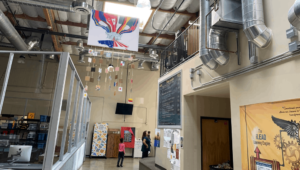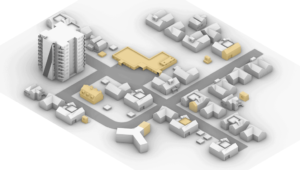Embracing the International Experience

By Dr. George B. Forsythe

Our global community depends on recent university graduates and current students to lead us into the future. Institutions of higher learning play a critical role in equipping students with the lifelong skills and perspectives necessary to thrive in an interdependent world. By fully embracing the international experience – sending U.S. students abroad and welcoming international students to our campuses – institutions recognize how truly connected the world is, and they provide a wonderful learning opportunity for students, faculty, and communities.
The Current American Dream: Importance of a Global Education
Since the terrible events of 9/11, we have become more cautious about establishing international ties. Fears of terrorism, economic concerns, and perceived intrusions on our way of life have led to a general sense that the “other” is a threat to us. In an increasingly interconnected world, this mode of thought must change for progress to be achieved.
Technology and global economics have made the world a much smaller place. While students are plugged into worldwide events via the Internet, technology alone cannot lead to cultural understanding. College graduates need to understand these interconnections on a much deeper level.
In 2012, global education is a necessity. As the world’s only surviving superpower, the United States needs to engage the world if we are to preserve our democratic values and maintain the standards of living that attract people of every nationality to our shores. The role of the university is to encourage the global conversation that addresses current tensions and proposes possible solutions. If new ideas and progress don’t originate from institutions of higher learning, where can we expect them to begin?
Colleges and universities have a mission to look beyond the campus and behold the world. One web-based tool that Westminster College students use to engage the world is Goinglobal, which includes worldwide job openings, internship listings, industry profiles, and country-specific career and employment information. This tool helps students find opportunities for international internships and employment, allowing them to put into practice what they have learned at the college.
Liberal Arts Education and International Progress
The diversity of a global community on campus promotes the educational aims of a liberal education. When students from various nations interact consistently in classrooms, residence halls, or on athletic fields, they develop a broader understanding of themselves and the world.
Furthermore, as social media and technology have enabled us to see how others live, young people are developing insight into new ways of thinking and being. These skills, in turn, prepare them to succeed in our global economy through effective communication and mutual respect. Just as the Olympics let young athletes compete in the spotlight of international unity, our global programs and liberal arts goals allow young scholars to shine in an academic community. Once these students leave the nest of academia, they’re able to offer these skills to employers who rely on international markets for their success.
Global Education Programs
Not surprisingly, global education programs, including global awareness curricula, foreign language study, study abroad, travel courses, and international internships, are flourishing in higher education. Meaningful encounters of substantial duration with different cultures broaden students’ perspectives and nurture a deeper understanding of their own culture’s place in the global community.
At Westminster, we offer a wide range of opportunities for students. In addition to traditional study abroad programs and international travel courses, we offer a program called Take-a-Friend-Home (for more information please see: http://www.westminster-mo.edu/churchillinstitute/CEW/TakeAFriendHome/Pages/default.aspx), designed to foster deep friendships between international and domestic students and provide for significant cultural immersion. This program provides the funding for international and domestic students to travel to each other’s homes during summer and winter breaks. Participation is limited, and students compete for this opportunity by writing a curriculum that outlines what each will derive from the experience. Before they travel, they take a for-credit course that prepares them for cultural immersion; when they return, they write a reflection paper and share their experiences with the college community.
In addition, students who take advantage of these opportunities develop the confidence to travel, work, and live around world. In our burgeoning world of international business, employers are seeking these qualities. Colleges and universities must prepare the next generation of leaders to succeed in our interconnected world.
The Global Community: Near and Far
For students who do not have the means to travel or study abroad, an international experience can take place on a local level. Many metropolitan areas have large international communities; spending time in these areas can impact students’ perceptions. Encounters that take students outside their comfort zones through immersion in different communities’ cultures strengthen students’ cultural knowledge and adaptability.
Technology also offers many outlets for international communication. The use of Facebook, Skype, and other online collaborative tools can help create global learning communities. Last year, computer science students conducted a real-time class with students from China using Skype. A Spanish professor has his students follow world leaders from Latin America and Spain on Twitter. Students keep track of their tweets and periodically report to the class what they have learned. For example, the class heard of drug cartel issues in Mexico and student riots in Chile, and what some leaders thought of obscure things, like the football strike that took place a couple of years ago here in the US. These virtual experiences have their limits in comparison to experiencing the sights and sounds firsthand, but they offer effective exposure to different cultural habits and practices on a personal level.
At Westminster College, we brought the world to Fulton, Missouri. Over the past decade, we have intentionally created a global community consisting of students from almost seventy countries. By working with the Davis United World College Scholars Program, we have transformed our campus. This program has allowed us to reach a critical mass of international students (16 percent), and more importantly, they come from over 70 countries, so our diversity is significant. International students are integrated into campus life, serving in the student government, joining fraternities and sororities, playing on sports teams, and participating in alumni events. A few years ago, one of our first-year seminars studied terrorism, and the upperclass student mentor was from Gaza. His personal experiences brought many of the course concepts to life for U.S. students who had never traveled beyond Missouri. We believe our graduates are better prepared to thrive in our interconnected world because of this intensive immersion experience, located right in America’s heartland.
Campuses must look for ways to foster meaningful interaction among students from diverse backgrounds. An anthropology professor has students interview someone from a different culture and report the results in an online blog. This exercise encourages students to get to know one another outside of class as they prepare their blog posts. In addition to helping students learn anthropology, this exercise helps create an international campus climate by bringing students from around the world together in meaningful dialogue.
It is one thing to bring students from all over the world to campus. It is quite another to form a true global community built on genuine understanding, mutual respect, common values, and shared goals. By encouraging host families in the community, both students and local families can participate in each other’s daily lives. Community-based events, such as athletic competitions, research presentations, and international talent shows, display the varying and unique cultures of our students. The planning and work required to achieve this gathering of voices can be daunting, but the reward is immeasurable for the students and community alike.
By opening students’ eyes to the world around them, universities can promote personal growth and practicality – and some semblance of job security in an economy that’s struggling to provide opportunities for our graduates. Our world is built on these vital, if sometimes tenuous, connections between nations and cultures. Striving to provide quality international opportunities and create diverse campus life strengthens the lines of communication and understanding.
Dr. George B. Forsythe, President of WestminsterCollege in Fulton, Missouri, has devoted his professional life to the fields of education and leadership training. A retired Brigadier General in the U.S. Army, he spent much of his 35 years of commissioned service at the U.S. Military Academy at West Point, serving as a Professor, Associate Dean of Academic Affairs and, finally, Vice Dean for Education for nine years. He came to Westminster as Dean of Faculty in 2005 and was appointed its 20th President in 2008. During his presidency, this private undergraduate liberal arts college has been transformed into a global leadership community nationally ranked for its diversity.
Photo courtesy of BigStock.




0 Comments
Leave a Comment
Your email address will not be published. All fields are required.